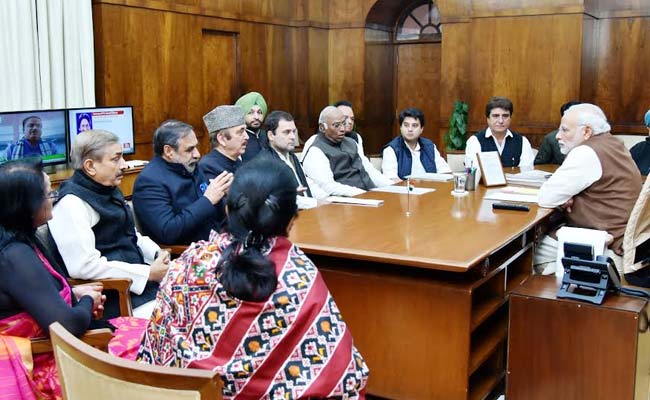Congress Volte Face: Now PM Modi Reads Rahul Gandhi's Lips In 4 Minutes

NEW DELHI: The Congress has again demonstrated its inability to lead from the front, and work in close collaboration with the other political Opposition. After revving up the decibels with a “read my lips, the Prime Minister is corrupt” statement, Congress leader Rahul Gandhi rushed to meet PM Narendra Modi this morning with a host of party leaders, while the winter session of Parliament was still on and without taking the other Opposition parties into confidence.
PM Modi gave the Congress delegation an exact four minutes. The issue was not demonetisation, but on the farmers with the PM receiving the memorandum without saying much.
In the process the Congress party fractured the Opposition unit that had managed to corner the government during the winter session of Parliament on demonetisation, with the Opposition leaders in both Houses of Parliament not believing the news until they had checked it out themselves. In just four minutes the Congress managed to lose the upper hand the Opposition had gained, with senior leaders openly asking “who has advised Rahul Gandhi?” And then shaking their heads at a leadership that has again not been consistent in its claims.
Farmers was an issue on which the Congress had been joined by other opposition parties in the House. As Nationalist Congress party leader Praful Patel said, “we had all raised the issue, raised slogans for the farmers rights in Parliament.” Others, off the record, said that the Congress was clearly so keen to be ahead on this issue, that it threw all strategy to the wind and rushed to meet the PM as soon as it got word that he was prepared to receive a delegation from the party.
The opposition anger was visible in what was supposed to have been part of joint action against demonetisation, with 16 political parties having decided to meet President Pranab Mukherjee. As a result of the Rahul Gandhi meeting with the PM, the Bahujan Samaj party, Left, DMK. NCP, Samajwadi party stayed behind with Congress president Sonia Gandhi accompanied by her party leaders, and MPs from the Trinamool Congress party and the Janata Dal(U).
TMC MPs despite going along with the Congress to Rashtrapati Bhawan were very critical of Rahul Gandhi’s decision to meet the PM early morning while Parliament was still in session. JD(U) was represented by Sharad Yadav, whose party is officially with PM Modi on demonetisation, at least Bihar Chief Minister Nitish Kumar is.
In four minutes, the unity achieved after a strong Parliament session lay in tatters with Rahul Gandhi and the Congress being held responsible by all the Opposition MPs in Parliament. There was no explanation as to why he had felt the urgency to meet the PM, and could have done the same as senior MPs pointed out to The Citizen, after the winter session of Parliament had ended. The timing could not have been worse, according to the MPs, who wondered at the soundness of a strategy that had the Congress leader accusing the PM of corruption the one day and rushing to meet him the very next morning.
Meanwhile PM Modi emerged with a fresh attack on the Opposition, and specifically the Congress for not being against corruption,asking whether a political party was bigger or the nation. He said that for the Congress, the party came before the nation “while for us the nation is bigger than the dal.” He regretted that the Opposition was siding with the Congress, singling out the Left for opposing demonetisation when under their own Chief Minister Jyoti Basu “the communists had favoured demonetisation.”
The Prime Minister was addressing the BJP parliamentary party. He said that the BJP and its NDA allies were fighting corruption, while the Opposition with the Congress was on the opposite end. His speech was in the most part a scathing attack on the Congress party for fostering and promoting corruption, saying that the party was responsible for bringing the nation to this point today. And added that he was trying to clean the system, for which he was being attacked by the same people who had institutionalised corruption in India.



